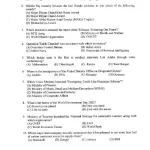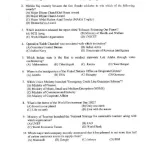The BA LLB 3rd semester is an important stage in the legal education journey. It helps students build a strong foundation in legal subjects. This article will provide key questions and answers from various subjects to help students effectively prepare for their exams.
Contract Law
Question: What is a contract?
Answer: A contract is a legally binding agreement between two or more parties with mutual consent to perform specific obligations.
Question: What are the essential elements of a valid contract?
Answer: The essential elements include offer, acceptance, consideration, intention to create legal relations, and legal capacity.
Question: What is the difference between void and voidable contracts?
Answer: A void contract is not legally enforceable from the start, whereas a voidable contract is enforceable unless one party chooses to void it.
Question: What are the types of contracts under the Indian Contract Act?
Answer: The types include express contracts, implied contracts, unilateral contracts, and bilateral contracts.
Question: Explain the concept of “offer” in contract law.
Answer: An offer is a proposal made by one party to another, with the intention of creating a legal obligation upon acceptance.
Question: What is acceptance in contract law?
Answer: Acceptance is the unconditional agreement to the terms of an offer, forming a binding contract.
Question: What is consideration in contract law?
Answer: Consideration is something of value that is exchanged between the parties to a contract, which is necessary for a contract to be valid.
Question: What are the legal rules for contract performance?
Answer: The performance must be in accordance with the terms of the contract, and if not, the party failing to perform can be held liable for breach.
Question: What is a breach of contract?
Answer: A breach of contract occurs when one party fails to fulfill their obligations under the agreement.
Question: What remedies are available for breach of contract?
Answer: Remedies include compensation (damages), specific performance, and rescission of the contract.
Question: What is a condition precedent in a contract?
Answer: A condition precedent is an event or action that must occur before a contract becomes effective or before a party’s obligation arises.
Question: What are implied terms in a contract?
Answer: Implied terms are provisions that are not explicitly stated in the contract but are assumed to be part of it due to the nature of the agreement or law.
Question: Define “capacity to contract.”
Answer: Capacity to contract refers to the legal ability of a party to enter into a contract. Persons under 18, mentally ill, or intoxicated individuals generally lack capacity.
Question: What is the principle of “freedom of contract”?
Answer: Freedom of contract allows parties to freely enter into agreements, subject to the conditions of legality and public policy.
Question: Explain the concept of “force majeure.”
Answer: Force majeure refers to unforeseeable circumstances that prevent a party from fulfilling their contractual obligations, often excusing performance.
Question: What is the difference between an executed and an executory contract?
Answer: An executed contract is one in which both parties have completed their obligations, while an executory contract is one that is yet to be performed.
Question: What is a contract of adhesion?
Answer: A contract of adhesion is a standardized contract where one party has greater power and imposes terms on the weaker party.
Question: What is the importance of legal intention in contracts?
Answer: Legal intention ensures that the parties intend to create enforceable obligations, without which the contract may not be valid.
Question: What are the different types of damages in breach of contract?
Answer: Types of damages include compensatory, punitive, nominal, and liquidated damages.
Question: Can a minor contract?
Answer: A minor generally cannot form a valid contract, except for contracts related to necessities or for which the minor is benefited.
Family Law
Question: What is the definition of marriage under Indian law?
Answer: Marriage under Indian law is a legal union between two individuals that establishes rights and obligations, recognized by the state.
Question: What are the essential requirements for a valid marriage in India?
Answer: The essential requirements include mutual consent, legal age, and the mental capacity to understand the implications of marriage.
Question: What is the difference between divorce and annulment?
Answer: Divorce ends a valid marriage, while annulment declares that a marriage was never valid from the start.
Question: What are the grounds for divorce under Hindu law?
Answer: Grounds include cruelty, adultery, desertion, and conversion to another religion, among others.
Question: Define “adoption” under family law.
Answer: Adoption is the legal process by which a person becomes the legal parent of a child, with all the rights and duties associated with parenthood.
Question: What is the concept of “maintenance” in family law?
Answer: Maintenance refers to financial support provided to a spouse or children after separation, divorce, or during legal proceedings.
Question: What is child custody?
Answer: Child custody refers to the legal right of a parent to care for and make decisions on behalf of a child.
Question: What is the Hindu Marriage Act, 1955?
Answer: The Hindu Marriage Act, 1955, governs the legal aspects of marriage, divorce, and other marital relations for Hindus in India.
Question: What are the provisions regarding the maintenance of a wife under the Hindu Marriage Act?
Answer: The wife is entitled to maintenance if she is unable to support herself, and the husband has a duty to provide this.
Question: Define “cruelty” in the context of divorce.
Answer: Cruelty involves behavior by a spouse that causes physical or mental harm, which can be grounds for divorce.
Question: What is the role of the Family Court under Indian law?
Answer: The Family Court handles matters relating to marriage, divorce, child custody, maintenance, and other family-related disputes.
Question: What are the different types of child custody?
Answer: The types include legal custody, physical custody, and joint custody, where parents share responsibility for the child.
Question: Can a person remarry after divorce?
Answer: Yes, a person can remarry after obtaining a divorce, subject to the completion of legal procedures.
Question: What is dowry harassment?
Answer: Dowry harassment refers to mistreatment of a woman by her in-laws for failing to meet dowry demands, which can lead to legal action.
Question: What are the rights of a married woman under Indian law?
Answer: Rights include the right to live in the marital home, claim maintenance, and seek divorce or separation if needed.
Question: What is “separation” in marriage?
Answer: Separation refers to a period where the spouses live apart, either voluntarily or due to legal orders, without officially ending the marriage.
Question: What are the rights of a child born out of wedlock?
Answer: A child born out of wedlock has the same rights to maintenance, inheritance, and other benefits as a legitimate child.
Question: What is the Muslim Women (Protection of Rights on Divorce) Act, 1986?
Answer: This act protects the rights of Muslim women regarding maintenance after divorce, mandating the husband to provide for her.
Question: How is property divided after divorce under Hindu law?
Answer: Property division is based on mutual agreement or through court order, taking into account both spouses’ contributions and needs.
Question: What is the concept of “alimony”?
Answer: Alimony refers to the financial support provided by one spouse to the other after separation or divorce.
Constitutional Law
Question: What is the Constitution of India?
Answer: The Constitution of India is the supreme law of the land, outlining the framework for the governance of the country.
Question: What are fundamental rights under the Constitution?
Answer: Fundamental rights are basic human rights guaranteed by the Constitution, such as the right to equality, freedom of speech, and protection against discrimination.
Question: What is the difference between a directive principle and a fundamental right?
Answer: Fundamental rights are enforceable by courts, while directive principles are guidelines for the government to follow but are not legally enforceable.
Question: What is judicial review in the Indian context?
Answer: Judicial review refers to the power of the judiciary to examine and determine the constitutionality of legislative and executive actions.
Question: What are the powers of the President of India?
Answer: The President of India has executive, legislative, judicial, and emergency powers, serving as the head of state.
Question: Explain the concept of “separation of powers.”
Answer: Separation of powers divides governmental authority among the executive, legislative, and judiciary branches to prevent misuse of power.
Question: What is the role of the Parliament in India?
Answer: The Parliament is responsible for making laws, scrutinizing the executive, and representing the interests of the public.
Question: What is the system of checks and balances in the Indian Constitution?
Answer: Checks and balances ensure that no branch of government exceeds its power by allowing the other branches to oversee and limit actions.
Question: What is the significance of Article 32 of the Indian Constitution?
Answer: Article 32 grants the right to move the Supreme Court for the enforcement of fundamental rights.
Question: Define “judicial activism.”
Answer: Judicial activism refers to judicial rulings that go beyond interpreting the law, often involving court involvement in public policy decisions.
Question: What is the concept of “federalism” in India?
Answer: Federalism in India refers to the division of power between the central government and state governments.
Question: What is the importance of the Preamble of the Constitution?
Answer: The Preamble sets forth the objectives of the Constitution, such as justice, liberty, equality, and fraternity.
Question: What are the functions of the Supreme Court of India?
Answer: The Supreme Court hears appeals, resolves disputes between states or the center, and interprets the Constitution.
Question: What is the concept of “residuary power”?
Answer: Residuary powers refer to matters not specifically mentioned in the Constitution, which are vested in the central government.
Question: Explain the significance of “parliamentary sovereignty.”
Answer: Parliamentary sovereignty means that the Parliament has the supreme power to make and change laws.
Question: What are the qualifications required to become a judge of the Supreme Court?
Answer: A judge must be a citizen of India, have at least five years of experience as a high court judge, or have been a lawyer for 10 years.
Question: What is the significance of the 73rd and 74th Constitutional Amendments?
Answer: These amendments promote decentralized governance by empowering local bodies like Panchayats and Municipalities.
Question: What is the concept of “Basic Structure Doctrine”?
Answer: The Basic Structure Doctrine holds that certain fundamental features of the Constitution cannot be altered by Parliament.
Question: Define “reservation” in the Indian context.
Answer: Reservation refers to the provision of seats in education, employment, and legislature for underrepresented communities such as Scheduled Castes, Tribes, and OBCs.
The knowledge gained through the 3rd semester of the BA LLB course is crucial for building a solid legal career. Understanding the subjects covered through these questions and answers will help students perform well in their exams and gain a deeper insight into the legal world.
Latest Posts
- Step-by-step guide to download and apply for jee mains admit card 202
- Comprehensive 2025 government holidays and recruitment details for job seekers
- JEE Mains Admit Card 2025: Your Step-by-Step Guide to Downloading the Hall Ticket
- Everything You Need to Know About 2025 Government Holidays Recruitment
- Comprehensive Guide to rrb d group recruitment 2025 – Eligibility, Vacancies, and Application
- Detailed guide to nps trust recruitment 2025 vacancies, eligibility and apply process
- Comprehensive guide to hpcl recruitment 2025 notification, vacancies, and application process
- ignou bed admission 2025 complete recruitment guide with eligibility and process
- Comprehensive Guide to Indian Army Agniveer Recruitment 2025 Notification and Jobs
- Everything You Must Know About CBSE Board Exams 2025 Changes & New Rules






